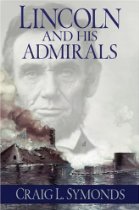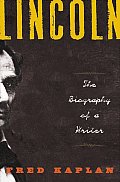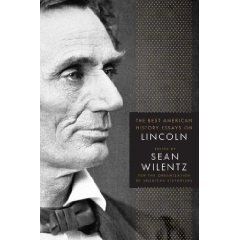Three more Lincoln books for your consideration. I have looked through all of them and they are excellent.
First up, Craig L. Symonds’ Lincoln and His Admirals vividly describes Lincoln’s thought process, the obstacle against him, and how he came to the most important decision of the war in regard to his navy: the resupplying for Fort Sumter. By forcing the South’s hand to fire the first shots, Lincoln masterfully avoided serious political and social issues. The rest of the book is an excellent study of Lincoln’s involvement in Navy strategy and his ability to see the whole picture.
Fred Kaplan’s Lincoln: The Biography of a Writer is an interesting look at Lincoln’s lighter and darker sides. Though the book is not ground breaking, it is an interesting take on Lincoln and would be a good read for those interested in learning more about Lincoln’s passion for literature and poety.
Finally, Best American History Essays on Lincoln by Organization of American Historians Staff, edited by Sean Wilentz . This is a top notch collection of essays from some of the leading historians on Lincoln. A bit redundant at times, though enjoyable and readable, this collection is convenient and a must for most Lincoln enthusiasts.
More about these fine books:
 Lincoln and His Admirals
Lincoln and His Admirals
Craig L. Symonds, hardback, 448 pages
Publisher: Oxford
From the publisher: Abraham Lincoln began his presidency admitting that he knew “little about ships,” but he quickly came to preside over the largest national armada to that time, not eclipsed until World War I. Written by prize-winning historian Craig L. Symonds, Lincoln and His Admirals unveils an aspect of Lincoln’s presidency unexamined by historians until now, revealing how he managed the men who ran the naval side of the Civil War, and how the activities of the Union Navy ultimately affected the course of history.
Beginning with a gripping account of the attempt to re-supply Fort Sumter–a comedy of errors that shows all too clearly the fledgling president’s inexperience–Symonds traces Lincoln’s steady growth as a wartime commander-in-chief. Absent a Secretary of Defense, he would eventually become de facto commander of joint operations along the coast and on the rivers. That involved dealing with the men who ran the Navy: the loyal but often cranky Navy Secretary Gideon Welles, the quiet and reliable David G. Farragut, the flamboyant and unpredictable Charles Wilkes, the ambitious ordnance expert John Dahlgren, the well-connected Samuel Phillips Lee, and the self-promoting and gregarious David Dixon Porter. Lincoln was remarkably patient; he often postponed critical decisions until the momentum of events made the consequences of those decisions evident. But Symonds also shows that Lincoln could act decisively. Disappointed by the lethargy of his senior naval officers on the scene, he stepped in and personally directed an amphibious assault on the Virginia coast, a successful operation that led to the capture of Norfolk. The man who knew “little about ships” had transformed himself into one of the greatest naval strategists of his age.
A unique and riveting portrait of Lincoln and the admirals under his command, this book offers an illuminating account of Lincoln and the nation at war. In the bicentennial year of Lincoln’s birth, it offers a memorable portrait of a side of his presidency often overlooked by historians.
Craig L. Symonds is Professor Emeritus at the U.S. Naval Academy and the author of ten previous books, including Decision at Sea: Five Naval Battles that Shaped American History , which won the Theodore and Franklin D. Roosevelt Prize in 2006.
—–
 Lincoln: The Biography of a Writer
Lincoln: The Biography of a Writer
by Fred Kaplan, hardcover, 416 pages
Publisher: Harper
Publisher Comments: For Abraham Lincoln, whether he was composing love letters, speeches, or legal arguments, words mattered. In Lincoln, acclaimed biographer Fred Kaplan explores the life of America’s sixteenth president through his use of language as a vehicle both to express complex ideas and feelings and as an instrument of persuasion and empowerment. Like the other great canonical writers of American literature — a status he is gradually attaining — Lincoln had a literary career that is inseparable from his life story. An admirer and avid reader of Burns, Byron, Shakespeare, and the Old Testament, Lincoln was the most literary of our presidents. His views on love, liberty, and human nature were shaped by his reading and knowledge of literature.
Fred Kaplan is a Distinguished Professor Emeritus of English at Queens College and the Graduate Center of the City University of New York. He is the author of several biographies including The Singular Mark Twain, Gore Vidal, Henry James, The Imagination of Genius, Charles Dickens and Thomas Carlyle, which was a finalist for the National Book Critics Circle Award and the Pulitzer Prize. He lives in Boothbay, Maine.
—–
 Best American History Essays on Lincoln by Organization of American Historians Staff, Sean Wilentz. softcover. 252 pages.
Best American History Essays on Lincoln by Organization of American Historians Staff, Sean Wilentz. softcover. 252 pages.
Publisher: Palgrave Macmillan
From the publisher: This new volume in the “Best American History Essays” series brings together classic writing from top American historians on one of our greatest presidents. Ranging from incisive assessments of his political leadership, to explorations of his enigmatic character, to reflections on the mythos that has become inseparable from the man, each of these contributions expands our understanding of Abraham Lincoln and shows why he has been such an object of enduring fascination. Contributors include:* James McPherson* Richard Hofstadter* Edmund Wilson* David Donald* John Hope Franklin* James Horton* David M. Potter* Richard Current* Mark Neely* Gabor S. Borritt* Jean Baker* Don Fehrenbacher* Merrill Peterson
Sean Wilentz is the Dayton-Stockton Professor of History at Princeton University. He regularly writes on history and politics for publications such as The New York Times, The Los Angeles Times, The New Republic, and Salon.com. His most recent book is The Rise of American Democracy: Jefferson to Lincoln.
By the way, though the admiral was Lincoln’s and George Monk. This article is written http://the100.ru/en/admirals/page103.html